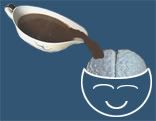Forgotten Genius
 Firstly, I'd like to apologize for my long absence. Due to schoolwork, job searching and a lot of other assorted goodness, I have been neglecting my other duties such as updating this website. For this, I am sorry. However, I would like to say that I will be updating more often now, even through the exam season. The next stint of updates will be directed towards informing you about specific topics in science that have piqued my interest. Hopefully, they will do the same for you.
Firstly, I'd like to apologize for my long absence. Due to schoolwork, job searching and a lot of other assorted goodness, I have been neglecting my other duties such as updating this website. For this, I am sorry. However, I would like to say that I will be updating more often now, even through the exam season. The next stint of updates will be directed towards informing you about specific topics in science that have piqued my interest. Hopefully, they will do the same for you.Although this is quite late for Black History Month, I would like to draw your attention to noted chemist Percy Julian. Recently, NOVA, PBS's documentary-style science program, aired a documentary regarding his life, struggles and discoveries. Through the wonders of this internet age, we may easily (and freely) enjoy it online:
Forgotten Genius
It is quite compelling and inspiring to watch. Julian's story has it all: tension, explosions, perseverance, discovery, racism, money and more.
Here's a very brief summary: Julian grew up in the post-reconstructionist South of the United States; this was a time and place where racism abounded, even lynchings were regular. This documentary outlines his struggles to education and rise within the world of chemical synthesis. Throughout, race issues play a key role.
Why should you care about Percy Julian on a scientific basis?
Significance of Julian's work:
first to synthesize physostigmine: used to treat glaucoma among other things
first to efficiently synthesize progesterone (on an industrial scale): used in birth control pills
played key role in industrializing synthesis of cortisone: used to treat rheumatoid arthritis
Aside from the science aspects of this documentary, I found it notable how Julian's parents placed such a great importance of education. Almost to the extent of it bringing a type of liberation. In one way it did: it brought him prestige and opportunities that may have never come to a Black man of his day. Personally, I believe that education is the greatest investment one can make in their lives; in themselves or in others.
Of course there is the flip-side, had Julian been white or in a different place and time we would most likely have held the top scientific posts around the country.
The program later deals with the inequality in the sciences for Black people today. Although I will neither make any bold statements about why this may be nor will I play the blame game. I will point out that there is a large discrepancy between the proportion of Black scientists (at the Baccalaureate and Graduate levels) and the proportion of Blacks in the general population.
While we are pointing things out, there is also an underrepresentation of women in the sciences. As to why this may be is just as contentious as to the Black underrepresentation.
I must say that my unwillingness to take a stance on such issues is not because I have no stance, but because (a) I don't think this is the place for such arguments and (b) there are many, many facets to these issues that need further investigation. However, with that said, if you really want to have a discussion about this, there is a lovely place to comment below this post, and my inbox is always open.
If you enjoyed these learning tips and motivational strategies, maybe you'll enjoy the other posts. Please bookmark this page (Ctrl-D) or check out the archive/categories to the right. Better yet, tell a friend! (Click the envelope below this.)
Labels: Musings, Random Interesting Facts









0 Comments:
Post a Comment
<< Home